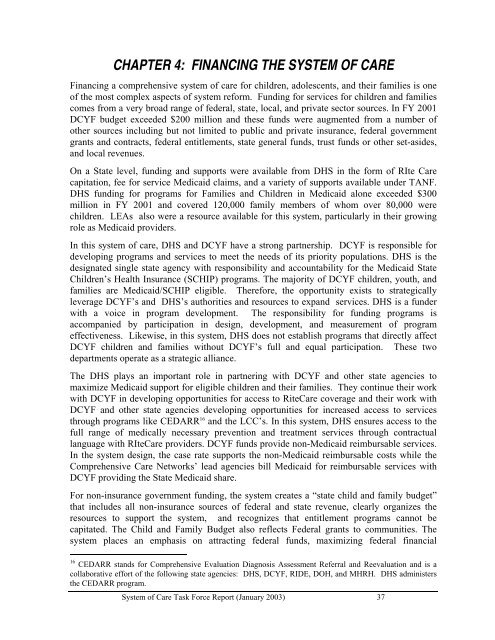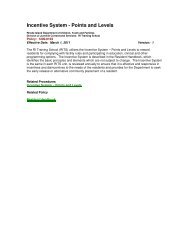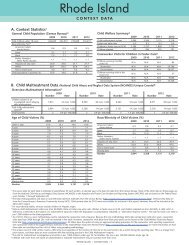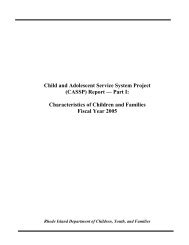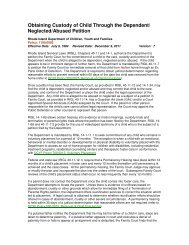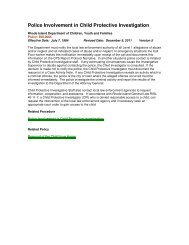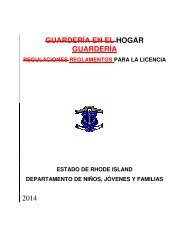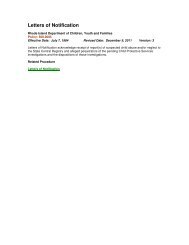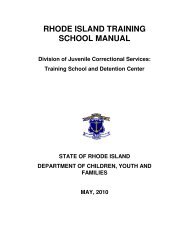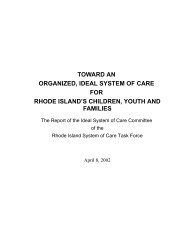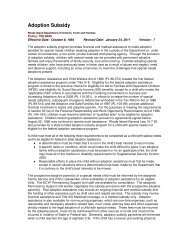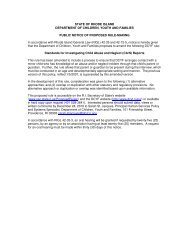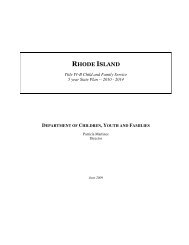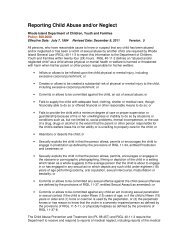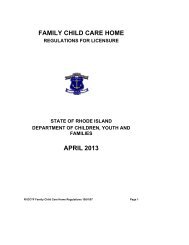Final Report - RI Department of Children, Youth & Families
Final Report - RI Department of Children, Youth & Families
Final Report - RI Department of Children, Youth & Families
You also want an ePaper? Increase the reach of your titles
YUMPU automatically turns print PDFs into web optimized ePapers that Google loves.
CHAPTER 4: FINANCING THE SYSTEM OF CARE<br />
Financing a comprehensive system <strong>of</strong> care for children, adolescents, and their families is one<br />
<strong>of</strong> the most complex aspects <strong>of</strong> system reform. Funding for services for children and families<br />
comes from a very broad range <strong>of</strong> federal, state, local, and private sector sources. In FY 2001<br />
DCYF budget exceeded $200 million and these funds were augmented from a number <strong>of</strong><br />
other sources including but not limited to public and private insurance, federal government<br />
grants and contracts, federal entitlements, state general funds, trust funds or other set-asides,<br />
and local revenues.<br />
On a State level, funding and supports were available from DHS in the form <strong>of</strong> <strong>RI</strong>te Care<br />
capitation, fee for service Medicaid claims, and a variety <strong>of</strong> supports available under TANF.<br />
DHS funding for programs for <strong>Families</strong> and <strong>Children</strong> in Medicaid alone exceeded $300<br />
million in FY 2001 and covered 120,000 family members <strong>of</strong> whom over 80,000 were<br />
children. LEAs also were a resource available for this system, particularly in their growing<br />
role as Medicaid providers.<br />
In this system <strong>of</strong> care, DHS and DCYF have a strong partnership. DCYF is responsible for<br />
developing programs and services to meet the needs <strong>of</strong> its priority populations. DHS is the<br />
designated single state agency with responsibility and accountability for the Medicaid State<br />
<strong>Children</strong>’s Health Insurance (SCHIP) programs. The majority <strong>of</strong> DCYF children, youth, and<br />
families are Medicaid/SCHIP eligible. Therefore, the opportunity exists to strategically<br />
leverage DCYF’s and DHS’s authorities and resources to expand services. DHS is a funder<br />
with a voice in program development. The responsibility for funding programs is<br />
accompanied by participation in design, development, and measurement <strong>of</strong> program<br />
effectiveness. Likewise, in this system, DHS does not establish programs that directly affect<br />
DCYF children and families without DCYF’s full and equal participation. These two<br />
departments operate as a strategic alliance.<br />
The DHS plays an important role in partnering with DCYF and other state agencies to<br />
maximize Medicaid support for eligible children and their families. They continue their work<br />
with DCYF in developing opportunities for access to RiteCare coverage and their work with<br />
DCYF and other state agencies developing opportunities for increased access to services<br />
through programs like CEDARR 16 and the LCC’s. In this system, DHS ensures access to the<br />
full range <strong>of</strong> medically necessary prevention and treatment services through contractual<br />
language with <strong>RI</strong>teCare providers. DCYF funds provide non-Medicaid reimbursable services.<br />
In the system design, the case rate supports the non-Medicaid reimbursable costs while the<br />
Comprehensive Care Networks’ lead agencies bill Medicaid for reimbursable services with<br />
DCYF providing the State Medicaid share.<br />
For non-insurance government funding, the system creates a “state child and family budget”<br />
that includes all non-insurance sources <strong>of</strong> federal and state revenue, clearly organizes the<br />
resources to support the system, and recognizes that entitlement programs cannot be<br />
capitated. The Child and Family Budget also reflects Federal grants to communities. The<br />
system places an emphasis on attracting federal funds, maximizing federal financial<br />
16 CEDARR stands for Comprehensive Evaluation Diagnosis Assessment Referral and Reevaluation and is a<br />
collaborative effort <strong>of</strong> the following state agencies: DHS, DCYF, <strong>RI</strong>DE, DOH, and MHRH. DHS administers<br />
the CEDARR program.<br />
System <strong>of</strong> Care Task Force <strong>Report</strong> (January 2003) 37


